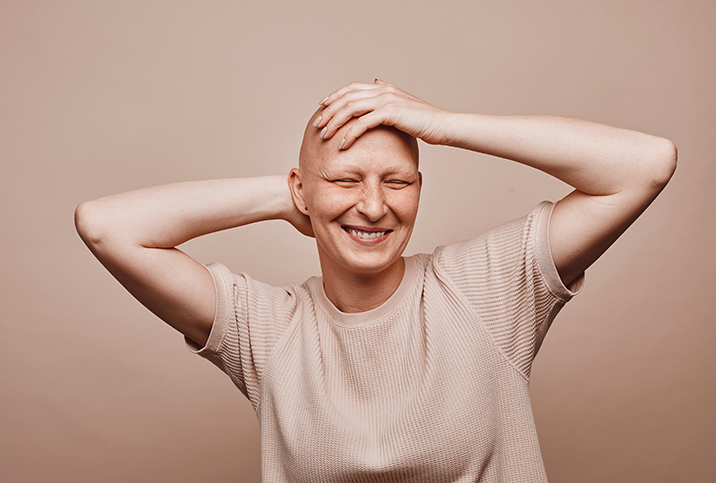Cold Capping During Chemo Can Reduce Hair Loss

When it comes to breast cancer, treatments such as mastectomies and chemo are life-saving, but they also cause drastic physical side effects for the patient. "Hair loss is one of the biggest fears of cancer treatment," said Jean Sachs, chief executive officer of Living Beyond Breast Cancer. "Patients are most concerned with how these treatments will impact their body."
Sachs went on to explain that many cancer patients are surprised at how long it takes them to recover from their treatment. While not all patients lose their hair, for those who do, it takes time to grow back and may never return to its original thickness or texture. Women with stick-straight hair can suddenly find themselves with curly locks.
Thankfully, cold capping is a treatment that can help prevent hair loss and increase hair regrowth.
An overview of cold capping
Cold capping, also called scalp cooling and scalp hypothermia, is a process that has been used since the 1970s. It is most effective when used consistently before, during and after chemotherapy treatment sessions. The goal of this process is to cool the scalp, slowing the blood flow to your hair follicles, which will then reduce the amount of cancer drugs that reach the hair.
Some cooling systems involve placing cold packs on the scalp and rotating out the packs as they warm. The goal is to keep the scalp as close to 32 degrees Fahrenheit as possible. However, it can be difficult to maintain a constant temperature with this method.
Newer systems utilize a cap worn by the patient that can be programmed to maintain a specific temperature. Liquid is then circulated through the cap to cool the scalp. Experts recommend cooling your scalp starting 30 minutes before your chemo treatment begins, and then continuing to wear the cap during and after.
There are many companies that offer these cooling sessions, and while the FDA has approved some of these treatments, unfortunately, your insurance may not cover cold capping.
For the best chance of treatment coverage, you should contact your insurance company to learn about your options. Some companies will allow these alternative treatments with the recommendation and prescription of a physician. Because working out insurance coverage can be a lengthy process, it's best to talk with your doctor before you begin cancer treatments, so you can get the ball rolling as soon as possible.
The benefits and risks of cold capping
With so many factors to think about during cancer treatment, a patient may think their concern about hair loss is superficial. It's not. Research has shown maintaining a sense of normalcy and dignity is essential for a patient's mental health. Hair can be an important part of a person's identity, and not having hair can negatively impact their outlook.
"Cancer takes so much away from us physically," said Dana Donofree, cancer survivor and founder of AnaOno, "we get to a point where we want to say enough is enough." Dana emphasized that patients are often self-conscious about their changing bodies throughout treatment, and anything that can help them feel like themselves can be empowering.
Cold capping can be an important addition to cancer treatment because of its ability to help prevent hair loss. While many patients will still experience at least some degree of hair loss or thinning with cold capping, the extent of loss can be reduced. A 2017 study published in the Journal of the American Medical Association found 66 percent of women lost less than half their hair when they used cold capping during chemotherapy.
Hair can be an important part of a person's identity, and not having hair can negatively impact their outlook.
There are many benefits of cold capping, and research shows the risks to be minimal. According to the American Cancer Society, side effects include "headaches, neck and shoulder discomfort, chills, and scalp pain."
Some doctors have speculated the process could prevent chemotherapy medicine from reaching cancer cells that may be present in the scalp as a result of metastization, but multiple research studies on scalp cooling techniques have not found evidence of this.
In fact, a 2017 review of over 40 years of research into cold capping published in the Clinical Journal of Oncology Nursing found "no increase in scalp metastases or statistically significant difference in overall survival... when cooling was used." Additionally, a 2017 meta-analysis published in Breast Cancer Research and Treatment found "scalp cooling does not increase the incidence of scalp metastases."
Remember to always discuss any therapeutic treatments, such as cold capping, that you want to include in your overall cancer treatment plan with your doctors. This will ensure your medical team can work together to provide the most effective treatment while maintaining the best quality of life possible.


















